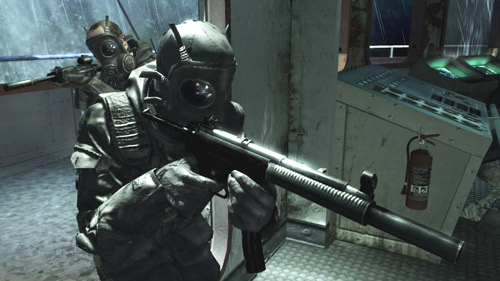Is Call of Duty a danger to gaming?
If you hear a lot of people (mostly young men) saying “dude” and “bro” more often over the next few days, it’s because it’s officially DudeBro Week. Also known as the week that the new Call of Duty game, Modern Warfare 3, hits stores.
Regular readers know I’m a big fan. I usually stay far, far away from playing video games online, firstly because they’re a giant time sink and secondly because if I wanted to hear incessant racist and homophobic babble, I’d hang out with my family (zing!).
Call of Duty games, however, are another matter entirely. Over the years, they’ve completely sucked me in with their crack-like addictiveness, to the point where I don’t even notice that it’s five a.m. and, holy crap, I’ve been playing for 12 hours. (The key is to immediately mute all those annoying players as soon as you log on.)
A little while back I started thinking about the Call of Duty phenomenon. With the games having sold more than 100 million units and grossed more than $5 billion, the war-themed shooter series is a bona fide entertainment juggernaut. Not many franchises post those kinds of numbers; Harry Potter, Star Wars and the like come to mind.
But the thing is, when an entertainment concern manages to rake in money of that scale, it usually has some sort of larger cultural impact. Star Wars, for example, has pretty much defined pop culture for a generation while Harry Potter has over the past few years spurred kids to read more and dress up like their favourite characters at Halloween. I couldn’t help but wonder whether Call of Duty has had any similar, larger effect.
When I was down at the Call of Duty XP fan convention in Los Angeles back in September, I thought that the answer might be yes. After all, the event attracted more than 7,000 DudeBros who paid $150 each for the chance to virtually shoot each other up and take in a horrible Kanye West performance. Also, at any point in time, there are seven million people online playing the games, an impressive number to be sure.
But is all of that enough to qualify as a cultural impact? For something to affect the larger culture, it has to have relevance outside its core audience, perhaps by spreading into other media or at least shaping and influencing the things we talk about.
I wasn’t sure, so I interviewed some of the games’ makers, then went and spoke with some games experts - academics, other creators and authors. The result was a story published on MSN over the weekend.
There was a lot that didn’t make it into that story, for length or thematic reasons. One of the experts I spoke to, Jane Pinckard - associate director at the University of California’s Santa Cruz Center for Games and Playable Media - talked a lot about how Call of Duty has become the must-play game in any given year. That gives it some cultural heft.
“It becomes a game that you have to have because you are a 24-year-old male and it’s what you’re supposed to be consuming,” she said. “When Lost is on, maybe you’re not watching but you feel like everyone else is, so you think maybe you should read about it.”
I also spoke with author Tom Bissell, who wrote Extra Lives: Why Video Games Matter, a critical dissection of several large game franchises and how they’ve affected his life. He had some good, but mostly bad, things to say about Call of Duty. Like me, he really enjoys the multiplayer, but he’s also very down on the franchise because its overwhelming success has effectively forced all major games to add online multiplayer modes if they are to be commercially viable, which doesn’t always fit the tone of the game. A case in point is the Uncharted franchise - the latest game has a really fun multiplayer option, but it’s completely unrecognizable from the main single-player game.
Moreover, as at least one of the speakers at the Montreal International Games Summit lamented last week, adding in these rich multiplayer features inevitably causes games’ budgets to skyrocket, which will eventually take a toll, whether it’s through higher prices on the games themselves or publishers green-lighting fewer titles. In the end, Bissell is right; it may be in everyone’s interest to reverse the trend propelled by Call of Duty and split up single-player and multiplayer games.
The other aspect Bissell touched on was the linear nature of Call of Duty’s single-player modes. The main storylines stick to a very tight script and don’t allow for much, if any, exploration or independent action on the part of the player. By forcing players down this “waterslide,” the games may provide a visceral thrill but they ultimately limit themselves in terms of long-lasting effect.
“Video game design should create a world that the player feels is his own. I can’t say I’ve ever had that feeling playing Call of Duty. That’s why they don’t create a whole lot of stuff for us to think about,” Bissell said. “I don’t think that’s what game design is or should be but we’re creeping closer to it with the unquestioned supremacy of these games.”
That’s definitely the case, if games such as Uncharted 3 and Battlefield 3 are any indication. Then again, there still are games like Skyrim that completely buck the trend. My review on that is coming Thursday…



Recent Comments